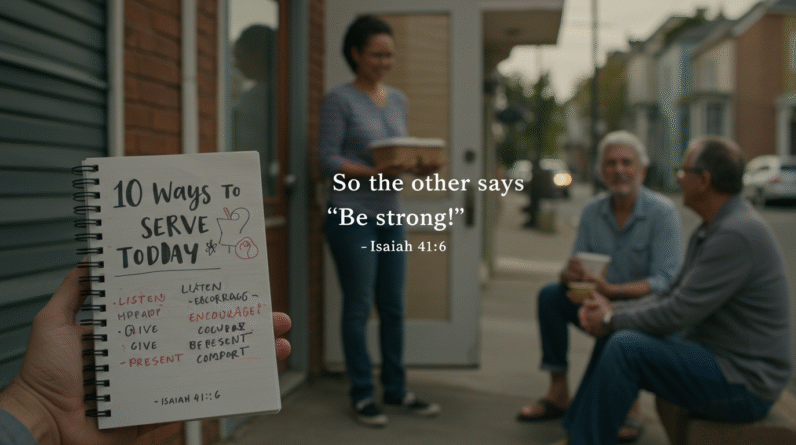Discover the profound message of Micah 7:18, exploring divine forgiveness and mercy. Reflect on how embracing these principles transforms modern life and relationships.
Verses to Live By – Micah 7:18
Introduction
In the whirlwind of today’s world, where every moment seems stolen by endless notifications, appointments, and obligations, it can be incredibly comforting to have something steady to cling to. Many of us look for wisdom, strength, and peace from various sources. Yet, the Bible, with its timeless words, remains a profound guide that transcends time and culture, offering solace and insight to millions. Today, we’re turning our attention to Micah 7:18, a verse that holds a deep well of meaning and serves as a beacon for our journey.
Verse Reference
Micah 7:18 (NIV):
“Who is a God like you, who pardons sin and forgives the transgression of the remnant of his inheritance? You do not stay angry forever but delight to show mercy.”
Meaning and Interpretation
To truly understand the depth and richness of this verse, it’s helpful to delve into its historical and cultural context. Micah was a prophet during a tumultuous time in the history of Israel. His messages often revolved around judgment due to the people’s unfaithfulness but also carried immense hope, focusing on the character and promises of God.
Micah 7:18 is a powerful testament to God’s nature—His readiness to forgive and His pleasure in showing mercy. At its core, this verse reflects the heart of God, unparalleled in compassion and willingness to forgive even when humankind repeatedly falls short. It’s a stark reminder of the stark difference between divine and human characteristics. While human tendencies often veer toward holding onto grudges, anger, and seeking retribution, God’s nature inclines toward mercy and forgiveness, welcoming back His people with open arms.
A God Unlike Any Other
In ancient times, people often perceived deities to be fickle and punishing, reflecting caprices of human rulers. But Micah sets apart the God of Israel, painting a picture of a deity far beyond these expectations—a God who actively chooses to forgive and embrace His people despite their frequent departures from His commands.
This passage, then, is not just about a momentary lapse in divine wrath; rather, it is a declaration of God’s eternal attribute. His readiness to forgive is not a reluctant concession but a joyful commitment made to the core of His being. It encapsulates a central Judeo-Christian belief: no matter how far one strays, God’s mercy and forgiveness are ever-present, ready to restore and renew.
Personal Reflection
Reflecting on Micah 7:18 brings to mind the countless moments in modern life when forgiveness seems like the hardest path to tread. In a society often driven by quick judgments and prolonged grudges, the concept of mercy can seem almost radical. How would our lives transform if we imitated this divine model?
In my own life, there have been periods when I’ve found it difficult to forgive—both others and myself. Yet, in those moments, turning to verses like Micah 7:18 has provided a profound perspective shift. It challenges me to see beyond my immediate feelings of hurt or betrayal and to focus on the restorative power of forgiveness. I am reminded that, just as God extends grace to me, I am also called to extend grace to those around me.
Imagine a world where mercy takes precedence over anger, where forgiveness inspires connections rather than divisions. The ripple effects of embracing such an ethos can be immeasurable. For those struggling with the weight of past mistakes or the strain of current conflicts, this verse offers the promise of new beginnings and restored relationships.

Life Application
Embracing Forgiveness in Daily Life
When it comes to living out the principles in Micah 7:18, there are several practical steps one can incorporate into everyday life:
- Reflect on Unresolved Conflicts: Start by identifying conflicts or grudges you may be holding. Seek to understand the roots of these feelings and ask yourself if they’re worth holding onto.
- Practice Forgiveness: This might feel like the most challenging step, but approach forgiveness as a process rather than a one-time event. Begin with small gestures of goodwill and slowly work towards total forgiveness in your heart.
- Emulate Divine Mercy: Remember, forgiving others is as much about you as it is about them. By forgiving, you release the hold that anger has on your well-being, allowing yourself healing and peace.
- Seek Compassionate Understanding: Engage in conversations aimed at reconciliation. Listen openly to others’ perspectives, paving the way for understanding and healing.
- Pray for Strength: Regularly reflect on Micah 7:18 in prayer or meditation. Ask for the strength to let go and love without reservations, taking inspiration from God’s example.
Sharing the Gift of Forgiveness
This verse also inspires us to act as conduits of God’s mercy in the broader community. Whether that means volunteering with organizations focused on restorative justice, supporting someone going through a tough time, or simply offering a listening ear, each action contributes to a culture of grace and forgiveness.
Closing Thought
Micah 7:18 is not just a verse to ponder but a lifestyle to embrace. As you navigate the complexities of daily life, allow the truth of this remarkable verse to permeate your actions and attitudes. Let the promise of unfailing mercy and boundless forgiveness guide you to be a source of peace and reconciliation.
Consider how this verse might inspire your next encounter, your next decision, or even your next thought. Remember, you carry within you the power to reflect divine qualities and transform the world around you.
As a ClickBank Affiliate, I earn from qualifying purchases.
Acknowledgment: All Bible verses referenced in this article were accessed via Bible Gateway (or Bible Hub).
“Want to explore more? Check out our latest post on Why Jesus? and discover the life-changing truth of the Gospel!”








